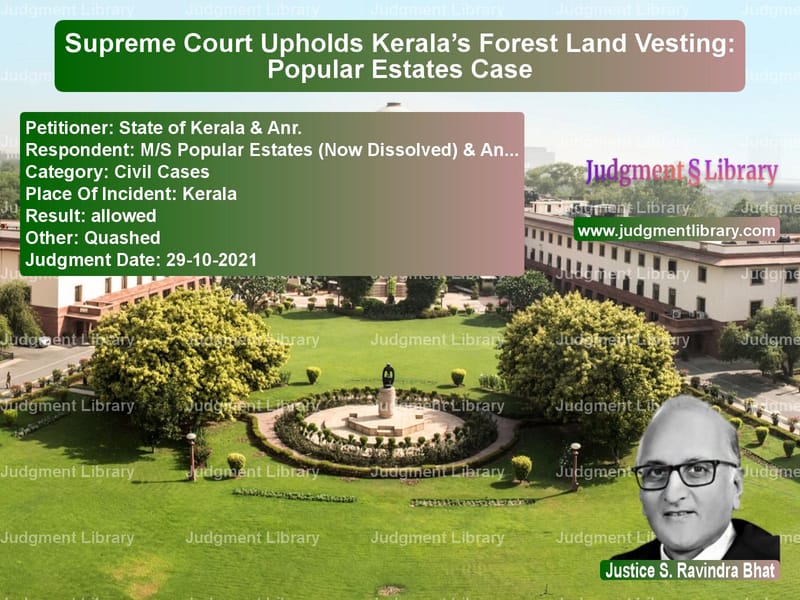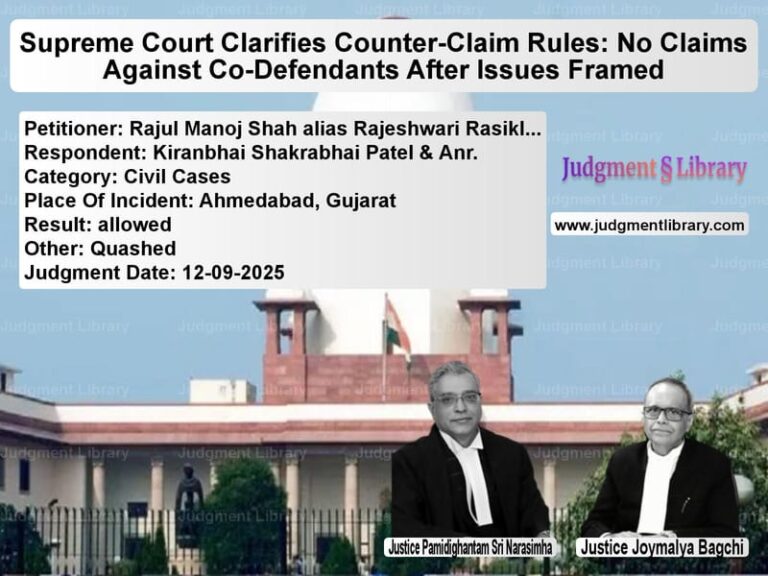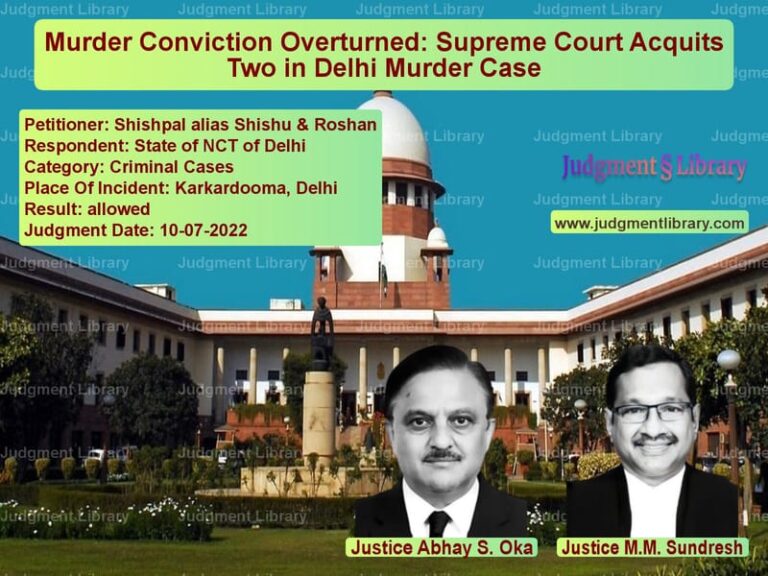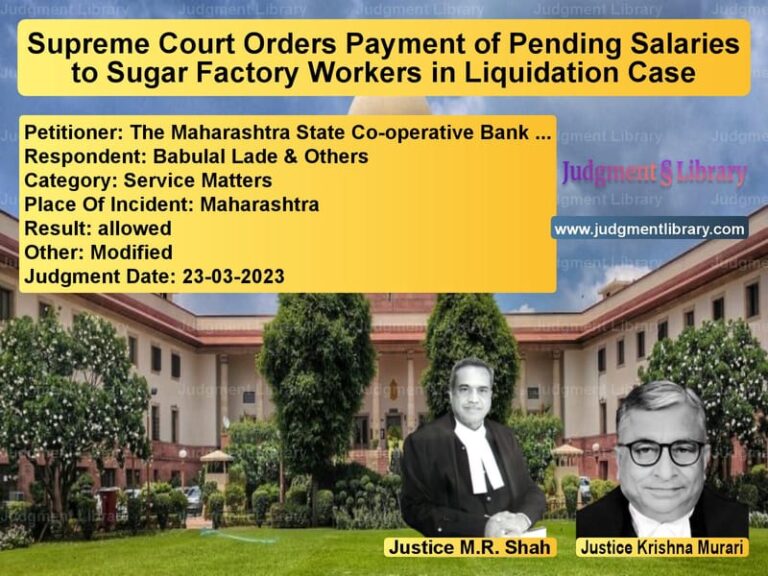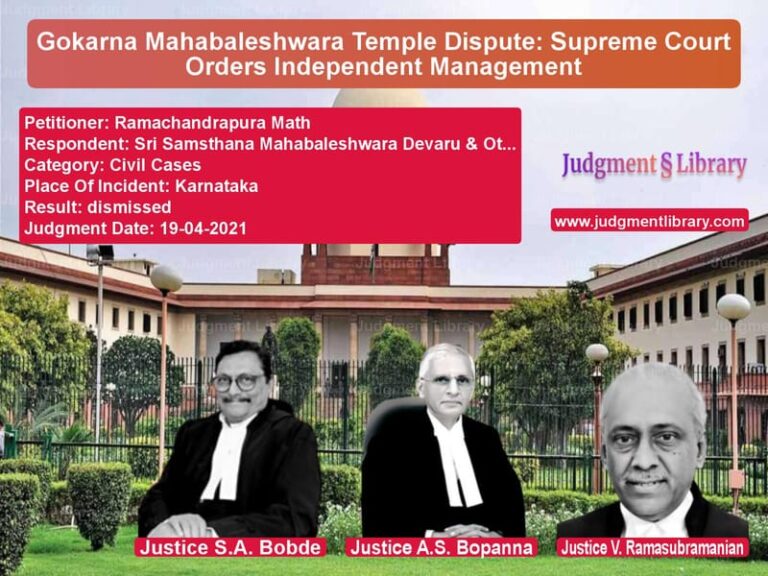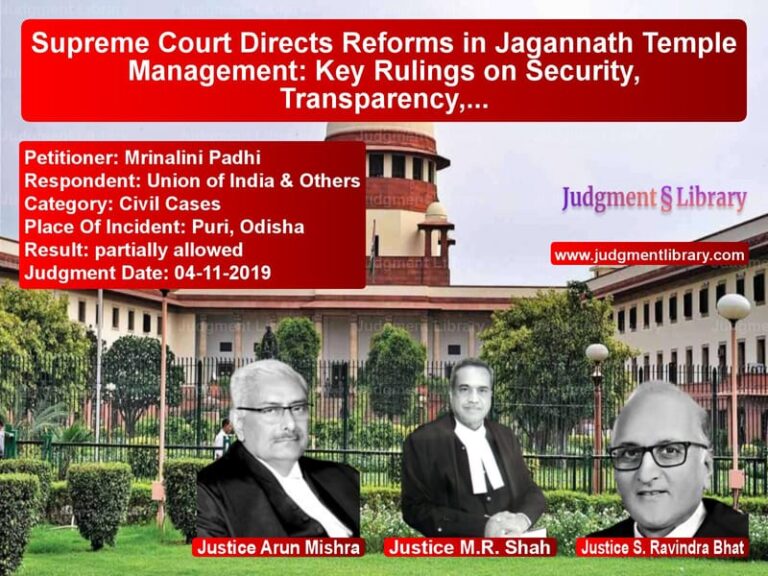Supreme Court Upholds Kerala’s Forest Land Vesting: Popular Estates Case
The Supreme Court of India recently ruled in the case of State of Kerala & Anr. vs. M/S Popular Estates (Now Dissolved) & Anr., setting aside the Kerala High Court’s decision and confirming that over 402 acres of private forest land vested with the State under the Kerala Private Forests (Vesting and Assignment) Act, 1971. The judgment reinforced the legal framework governing private forest land in Kerala and upheld the State’s claim over protected forests.
Background of the Case
The dispute concerned approximately 1534.40 acres of land owned by Popular Estates, acquired through registered sale deeds in 1963. The Kerala Private Forests (Vesting and Assignment) Act, 1971 (hereafter referred to as the “Vesting Act”) came into effect on May 10, 1971, transferring ownership of all private forests in Kerala to the government. Popular Estates challenged this vesting, arguing that their land was exempt from the Act as it was used for plantation and agricultural purposes.
The Forest Tribunal dismissed Popular Estates’ claim, confirming the State’s ownership of 402 acres of land. However, the Kerala High Court later ruled that only 100 hectares (247 acres) of the estate was forest land, and the rest should remain with Popular Estates. The State of Kerala appealed this decision before the Supreme Court.
Petitioner’s Arguments (State of Kerala)
The State of Kerala contended that:
- The land was covered under the Madras Preservation of Private Forests Act, 1949, making it subject to automatic vesting under the Vesting Act.
- Under Section 3 of the Vesting Act, all private forests in the State were deemed to be vested in the government, overriding any private claims.
- The Kerala High Court ignored crucial evidence from the Forest Tribunal, which established that the majority of the disputed land was classified as protected forest.
- Revenue entries alone do not confer ownership, and private landowners cannot override statutory notifications regarding forest land.
- The High Court erred in relying on land ceiling proceedings under the Kerala Land Reforms Act, 1963 as evidence of ownership.
Respondent’s Arguments (Popular Estates)
Popular Estates countered by arguing that:
- The land was primarily used for plantation crops such as rubber, coffee, and cardamom, exempting it from the Vesting Act.
- They had continuously cultivated the land, and official revenue records supported their ownership claims.
- The Kerala Land Reforms Act recognized their land as plantation, and the government had failed to prove that it was forest land.
- The Forest Tribunal relied on outdated surveys that did not accurately reflect the land’s use at the time of vesting.
Supreme Court’s Analysis
1. Do Land Ceiling Proceedings Prove Ownership?
The Supreme Court ruled that decisions of the Land Board under the Kerala Land Reforms Act were not binding in proceedings under the Vesting Act. The Court clarified that while land ceiling proceedings determine excess land holdings, they do not decide whether land is forested and subject to vesting.
“Land reform determinations do not override forest conservation laws. The Forest Tribunal’s findings are paramount in such cases.”
2. Does Revenue Records Override Statutory Notifications?
The Court held that revenue entries cannot override statutory notifications under the Indian Forest Act, 1927 or the Vesting Act. It reaffirmed that private individuals cannot claim ownership based solely on revenue records if the land is classified as forest under law.
“Revenue records are fiscal in nature and do not confer ownership. Forest notifications have legal precedence over revenue entries.”
3. Was the Land Used for Plantation or Forest?
The Court examined evidence regarding the land’s usage. It noted that Popular Estates failed to provide conclusive proof that the entire land was under plantation cultivation before the vesting date.
“The burden of proof lies on the claimant to establish plantation use. The absence of conclusive evidence favors the government’s case.”
Judgment and Conclusion
The Supreme Court set aside the Kerala High Court’s ruling and restored the Forest Tribunal’s decision, confirming the vesting of 402 acres of land with the State of Kerala. The Court emphasized the necessity of strict adherence to the Vesting Act and rejected claims based on revenue records and land ceiling proceedings.
The ruling reinforces the following principles:
- Statutory notifications regarding forest land have precedence over revenue records.
- Land ceiling proceedings do not determine forest status.
- Private landowners bear the burden of proving exemption from vesting.
- Forest conservation laws must be strictly applied to prevent illegal encroachment.
This judgment serves as a crucial precedent in cases involving private forest land claims and ensures the protection of forest resources under conservation laws.
Judges: The judgment was delivered by S. Ravindra Bhat.
Petition Result: Allowed
Petitioner Name: State of Kerala & Anr..Respondent Name: M/S Popular Estates (Now Dissolved) & Anr..Judgment By: Justice S. Ravindra Bhat.Place Of Incident: Kerala.Judgment Date: 29-10-2021.
Don’t miss out on the full details! Download the complete judgment in PDF format below and gain valuable insights instantly!
Download Judgment: state-of-kerala-&-an-vs-ms-popular-estates-supreme-court-of-india-judgment-dated-29-10-2021.pdf
Directly Download Judgment: Directly download this Judgment
See all petitions in Property Disputes
See all petitions in Landlord-Tenant Disputes
See all petitions in Judgment by S Ravindra Bhat
See all petitions in allowed
See all petitions in Quashed
See all petitions in supreme court of India judgments October 2021
See all petitions in 2021 judgments
See all posts in Civil Cases Category
See all allowed petitions in Civil Cases Category
See all Dismissed petitions in Civil Cases Category
See all partially allowed petitions in Civil Cases Category

